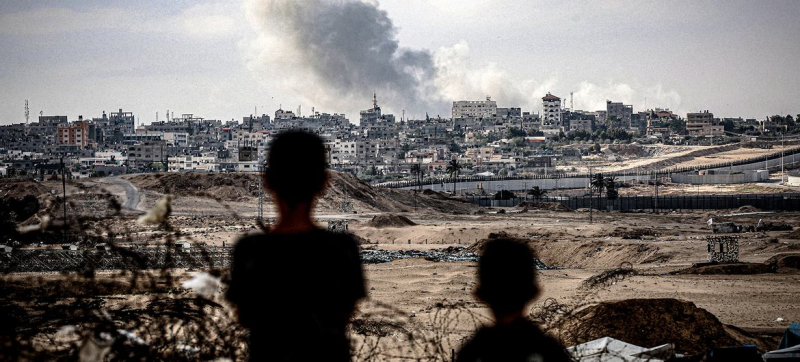- 40,000 people marooned in Kushtia flood; 13 schools shut |
- Ganga inundates low-lying areas in Rajshahi forcing evacuation |
- Yunus Invites Malaysian Investors to Explore Bangladesh |
- Guterres Seeks Probe Into Gaza Journalist Killings, Hunger Deaths |
- India Restricts Key Jute Imports via Land Borders |
Guterres Seeks Probe Into Gaza Journalist Killings, Hunger Deaths

Two children watch plumes of smoke rise after an airstrike hit Gaza City. (file)
UN Secretary-General António Guterres has condemned the killing of six Palestinian journalists in Gaza this past weekend, his spokesman said on Monday.
The reporters – five of whom worked for the Al Jazeera media network – were killed in a targeted Israeli strike in Gaza City the previous day.
“These latest killings highlight the extreme risks journalists continue to face when covering the ongoing war,” UN Spokesperson Stéphane Dujarric said during his regular media briefing from New York.
“The Secretary-General calls for an independent and impartial investigation into these killings.”
Mr. Dujarric pointed out that at least 242 journalists have been killed in Gaza since the war began nearly three years ago.
“The Secretary-General underscores that journalists and media workers must be respected, protected, and allowed to carry out their work freely, without fear or harassment,” he said.
Meanwhile, the number of children in Gaza who have died from malnutrition since October 2023 has surpassed 100, according to Gazan health authorities, the UN aid coordination office, OCHA, said in an update.
More than a third of the population is going without food for days at a time, according to the UN World Food Programme (WFP). Furthermore, acute malnutrition is spiking, with over 300,000 children at severe risk.
This comes amid a recent warning by the UN Food and Agriculture Organization (FAO) that only 1.5 per cent of cropland in the enclave remains both accessible and undamaged, “signalling a near-total collapse of the local production of food.”
On the aid front, the UN and its partners collected food and hygiene kits from the Kerem Shalom/Karem Abu Salem border crossing on Wednesday.
“However, supplies were offloaded directly from these trucks before reaching their destination, given the extreme desperation pervasive in Gaza today,” OCHA said.
The agency stressed that people there “need a predictable lifeline – not a trickle of aid – so they do not feel they need to take desperate measures to survive.”
WFP said that just to cover basic humanitarian food assistance needs, more than 62,000 metric tonnes are required to enter Gaza every month, but so far, humanitarians have not been permitted to bring in enough supplies to support the population.
Humanitarians also collected fuel from the Kerem Shalom crossing on Wednesday. Israel is allowing, on average, about 150,000 litres of fuel daily, which is still far below the minimum required. As a result, life-saving operations continue to be at risk.
The Palestine Civil Defence organization has warned that more than half of its ambulances have stopped operating across Gaza due to shortages of both fuel and spare parts.
“Israeli authorities must allow aid to enter through all crossings and via all available corridors so that humanitarians can deliver – at scale, in a safe and dignified manner – to reach the most vulnerable, including women, children, and older people,” OCHA said.

